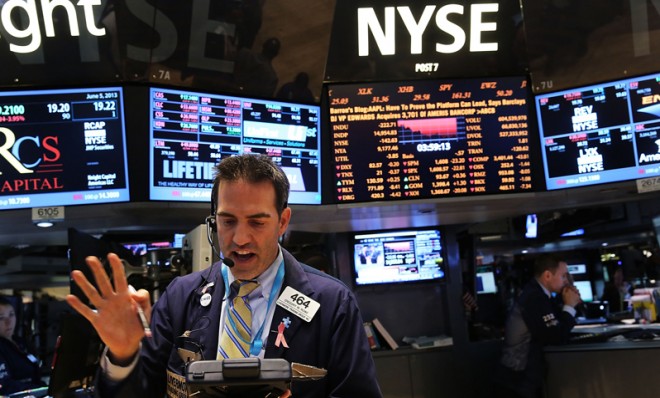Why economists aren't worried about a stock market bubble
The stock market is smashing records. That's no reason to panic

A free daily email with the biggest news stories of the day – and the best features from TheWeek.com
You are now subscribed
Your newsletter sign-up was successful
Is the stock market in bubble territory?
That question has been boiling for weeks — maybe months — particularly after the stock market smashed records set before 2008's collapse. Many analysts and investors have argued that the Federal Reserve's quantitative easing policies — in which it buys $85 billion in bonds each month, driving down interest rates and encouraging investors to shift their funds from low-yield securities — was artificially driving up prices.
But others, including nearly three dozen economists surveyed by the Associated Press, say no — while stocks are high (up 19 percent since November), they're not in bubble territory. Here are a few reasons why:
The Week
Escape your echo chamber. Get the facts behind the news, plus analysis from multiple perspectives.

Sign up for The Week's Free Newsletters
From our morning news briefing to a weekly Good News Newsletter, get the best of The Week delivered directly to your inbox.
From our morning news briefing to a weekly Good News Newsletter, get the best of The Week delivered directly to your inbox.
Corporate profits are up...
"A bubble is an extreme thing, when the market loses all contact with reality," Bill Cheney, chief economist at John Hancock Financial Services, told the Associated Press. "I don't think we're near anything like that." In fact, rising stock prices aren't entirely out of sync with corporate earnings. "The Standard & Poor's 500 stock index, relative to expected corporate earnings, is only about half its level of late 1999. That was a few months before the dot-com frenzy fizzled and punctured a stock-market bubble," says the Associated Press.
…and they're likely to stay that way.
"The fundamental trends that have driven the profit boom are unlikely to be reversed," says James Surowiecki in The New Yorker. More and more of corporate earnings come from abroad — nearly three times as much as in 2000. Though the world economy is in the pits, it's expected to grow more rapidly than the U.S. economy over the next 10 years. Also, corporations pay much less in taxes than they used to, and the decline of unions has allowed corporations to keep their payrolls trim, and therefore maximize profits, says Surowiecki.
A free daily email with the biggest news stories of the day – and the best features from TheWeek.com
The housing market is recovering...
Home prices jumped 12.1 percent from April 2012 to April 2013, signaling a continuing recovery of the housing market. That affects the stock market, too. Housing is "a key to stability since it was the cause of the last crash, and its plunge created a perfect storm that froze credit markets and hammered consumer confidence," says Richard Satran at U.S. News, though he warns some weak spots remain.
...and so is consumer confidence.
Economists think that higher stock prices (along with more jobs and higher home prices) will lead to higher spending, which would mean the stock market growth is sturdy and sustainable, says the Associated Press. Chris Howells at Forbes agrees: "Perhaps forecasters ignore the fact that many U.S. consumers own stocks and feel wealthier today, which should stimulate consumption," he says.
No one is "panic buying"
Stocks have been rising steadily, not in leaps and bounds, Satran says. "The first trading day this year saw a 300-point Dow rally of 2.35 percent — still the year's top gain, but nowhere in the top 50 one-day percentage gains."
Carmel Lobello is the business editor at TheWeek.com. Previously, she was an editor at DeathandTaxesMag.com.